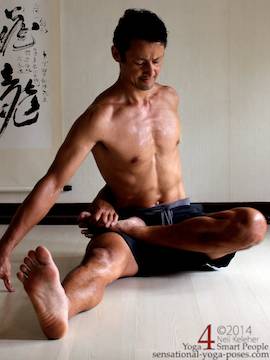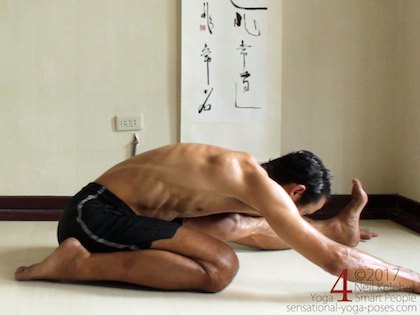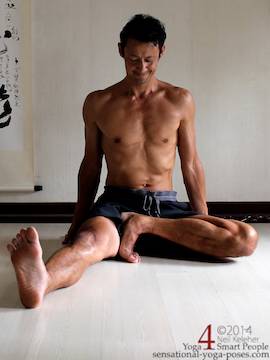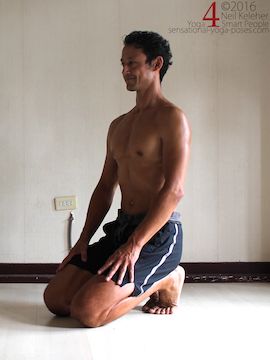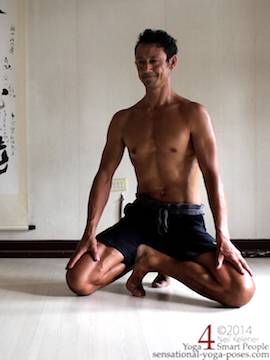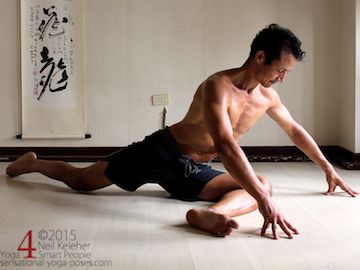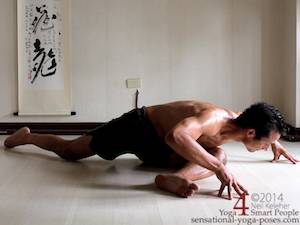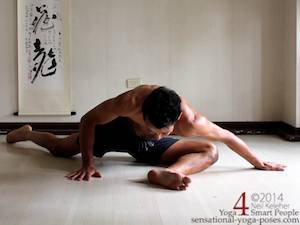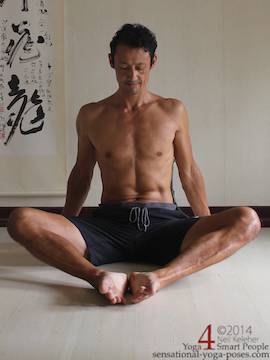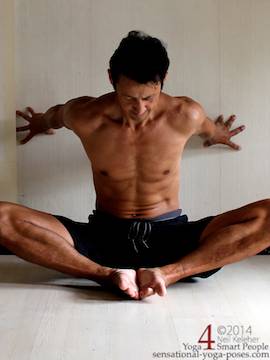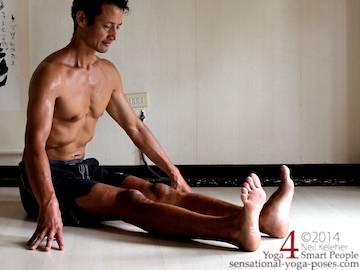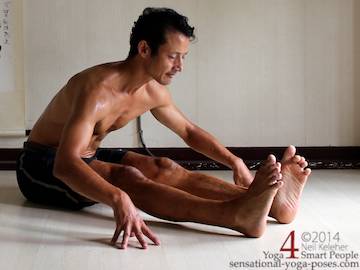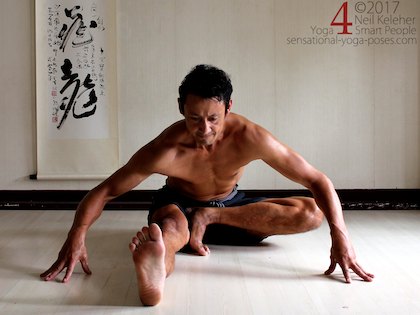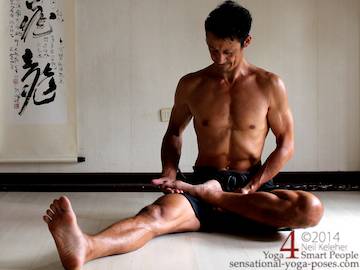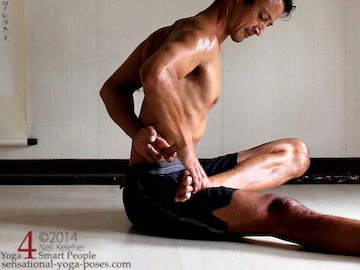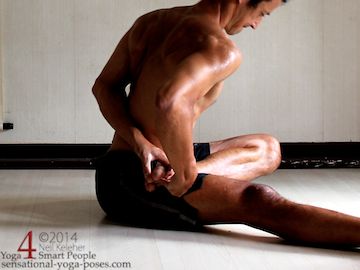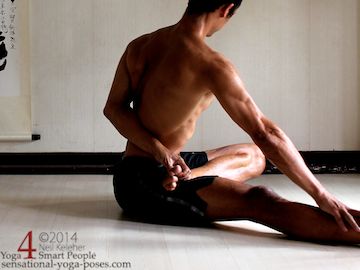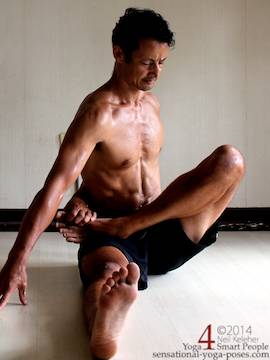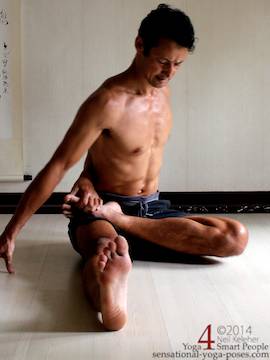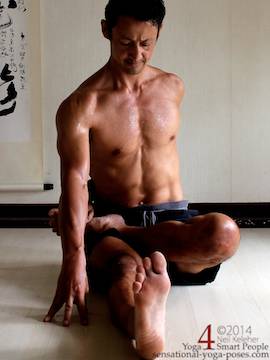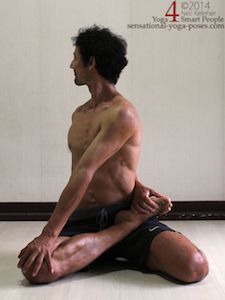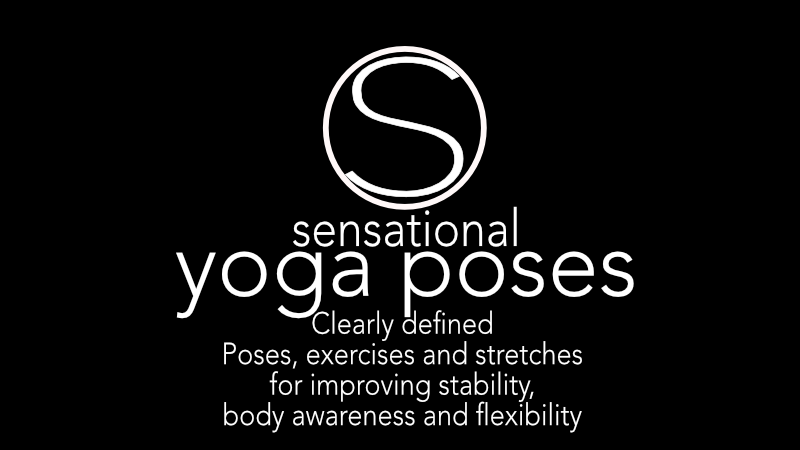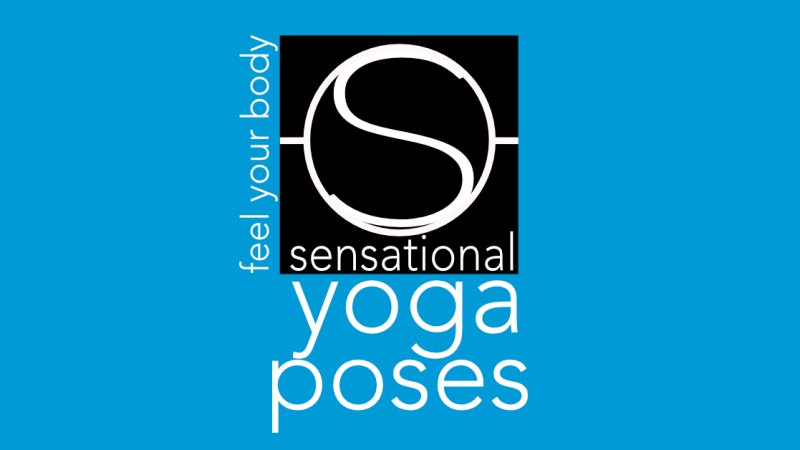Half Bound Lotus Yoga Pose
Working Towards it One Leg At a Time
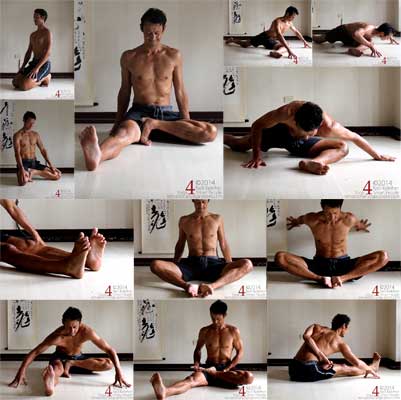
I'd suggest that before being able to do bound yoga lotus pose, you need to be able to bind with one leg. And that's what this article focuses on, half bound lotus yoga pose.
In the Yoga Lotus position:
- the knee is fully closed
- the shin folds to the inside of the leg
- the thigh is externally rotated
Because the knee is fully closed in bound lotus one of the first things that you can practice doing if you can't already do it is closing the back of the knee. If you can't kneel with your butt on your heel then chances are you won't be able to do lotus until you can.
If your kneeling ability is limited by tight ankles then you might want to work on stretching the ankles first.
Another point to note about lotus yoga pose is that the foot folds to the inside of the inner thigh.
In the above pose, the bent knee is in a position called hero or virasana.
You can see how the foot is folded to the outside of the thigh and the knee is closed.
The shin is actually able to rotate relative to the thigh when the knee is bent.
- In hero pose the shin is internally rotated to bring it to the outside of the thigh.
- In lotus pose the shin is externally rotated taking the foot to the inside of the thigh.
Janu Sirsasana C As a Prep for Yoga Lotus Pose
A pose that is remarkably similiar to the lotus yoga pose leg position in this regard is Janu Sirsasana c, shown below left.
Notice how the foot folds to the inside of the same-side thigh. Because of the similarity in foot position (and shin rotation) I like to use this pose as a preparation or possible substitute for lotus yoga pose.
To work towards janu sirsasana c (and then lotus yoga pose) you can try the following progression:
- Kneel with toes tucked under.
- Then turn one foot out. This is slightly easier than regular janu c since the hips are higher.
- From here you can do this with the top of the "kneeling" foot flat on the floor (not shown), then from here
- Janu c while upright.
Pigeon Pose as a Preparation for Yoga Lotus Pose
Another point to note about lotus yoga pose is that the thigh is externally rotated relative to the pelvis. A pose with a similiarly rotated leg position is pigeon pose glute stretch.
The most effective pigeon variation for stretching the hip for lotus, in my experience so far, is to start with the shin parallel to the front of your mat with the foot, knee and hip on the floor. Reach the other leg back.
The first part of this stretch is sink the ribcage down so that it contacts your front thigh. Use your hands to control the descent of your ribcage.
You may find that in this position it helps alot to press the knee into the floor, the front leg knee.
From here work at using your outside arm (the arm on the same side as the front leg) to push the ribcage towards your foot. As you press to the side you can focus on pressing your foot down (as opposed to the knee).
If you focus on pressing the front foot down into the floor you may find that you add tension to the outer line of the thigh and shin. You may feel the tension originating at the side of the hip and I'd suggest playing with the muscle tension there.
You may find an activation where it feels like the tension fills all of the space to the outside of the blade of the hip.
Note that in lotus yoga pose it can be very helpful to press down with the foot, and so that's why I suggest practicing this action in pigeon pose.
It may take some practice but you can work towards getting the shoulder towards your foot in pigeon pose. If your left leg is forwards then aim to get your left shoulder to your left foot.
Foot Activation In Yoga Lotus Pose
What may Not so obvious in the picture of lotus is that the foot is pressing down. Also there are a number of different foot shapes that you may be able to play with in lotus.
The important thing, I'd suggest, is keeping foot and ankle active. This tends to add tension to that foot and ankle, and that tension, if it radiates past the knee and also involves the hip, can be used to keep both joints safe and integrated and may allow you to work more easily into bound lotus yoga pose.
The key point is to modulate or vary the tension as you move into the pose.
Bound Angle as a Preparation for Lotus Pose
As a way to practice pressing the foot down and as a way to practice shaping the foot and ankle, you can use bound angle pose, first with feet forwards (so that you can easily bring your face to your feet) and then with the feet closer to the pelvis.
Bending forwards, or if you can't bend forwards, propping yourself up with hands on the floor behind you or against a wall, spread the inner edges of the feet and press them down into the floor.
More Foot Preparation Exercises for Yoga Lotus Pose
In a straight leg forward bend, or just sitting upright with the knees straight, and feet pointing up, press the blades of the feet forwards, then pull the blades of the feet back. Do this slowly and notice the change in sensation in the foot, ankle, and possibly the knee and the hip.
What you may find is that when you press forwards through the blade of your feet the shins roll outwards slightly. Because the knees are straight the shin doesn't rotate with respect to the thigh and so the thigh externally rotates also.
The opposite happens when you pull back on the blades of the feet.
Bending Forwards In Janusirsasana C
If you haven't done so already, I'd recommend working at bending forwards in janu sirsasana c, while pressing the heel inwards. Although it is difficult you could also play with pressing the foot into the floor.
Moving into Half Bound Lotus Yoga Pose
From here sit up and lift the foot onto the thigh for half bound lotus yoga pose.
Cradle the shin from underneath and as your bring the foot into position actively press your shin down against your hands. As you place the foot on the thigh maintain this pressure. You'll have to be creative with repositioning your hands as you place the foot.
Try to move the foot so that the heel contacts the belly. Work towards this. Also, I'd suggest a position where the toes are towards the outside of the thigh so that the center of the foot (from heel to toes) is approximately over the center of the thigh. Using this as a starting position adjust foot position for comfort of the foot and the thigh.
You can try moving the blade of the foot towards the knee (like pressing it forwards in the previous foot shaping exercise) or in the opposite direction.
So what about binding your foot in half bound lotus yoga pose? Hold the foot with one hand, then reach the other hand behind the back and grab the thumb of the first hand. From there use both hands to pull your foot towards your binding hand.
Note that you'll have to move the shoulder of the binding arm backwards. Retract the shoulder blade.
You may find it helps to turn your ribcage towards your lotus leg.
Once you've grabbed the foot (or even if you haven't) you can experiment with lifting the knee and then pushing it down.
Then try moving the knee inwards and then outwards.
Once you have grabbed the foot you can try pulling the foot forwards while at the same time using the shoulder to pull the arm backwards. The feeling is like you are trying to pull your foot away from your hand.
Bound Lotus Yoga Pose Variation-Bharadvajasana
One of my favorite lotus yoga pose variations is the bharadvajasana position.
In this pose the forearm presses into the lower back while twisting and you may find that you experience a nice release of the lower back. (The other hand can be on the knee as shown or on the floor to the outside of the knee as it is more traditionally done in the Ashtanga second series.)
Published: 2014 07 17
Updated: 2021 02 09

